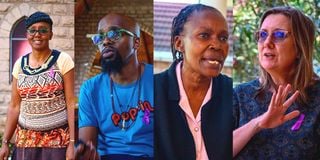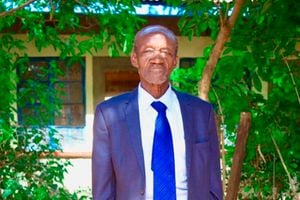
From left: Elizabeth Mutunga, Mugambi Nthiga, Damaris Ndichu and Julisa Rowe.
In Kenya, the weight of caregiving falls heavily on the shoulders of children when parents grow old or become terminally ill. Nursing homes remain a rare and culturally unpopular option, leaving adult children to manage the physical, emotional, and financial toll of caring for ageing or ailing parents.
The burden becomes even heavier when these parents suffer from debilitating conditions like dementia or Alzheimer's, a disease that destroys memory. For many caregivers, it is a silent struggle to take care of a loved one who does not know who you are. It is an act of love that reshapes their lives, often at a great personal cost.
Elizabeth Mutunga understands this burden all too well. At just 17, her father began showing early signs of dementia, thrusting her into the role of primary caregiver. As the eldest of three, she put her dreams on hold to support her family, becoming the breadwinner while ensuring her younger siblings could finish their education.
“My dad started getting sick in 1992, but it wasn’t until 2007 that we got the official diagnosis; Alzheimer’s disease,” Elizabeth recalls. “Before that, we didn’t know what was happening. He was a policeman, always dressing sharply, but suddenly, he started wearing pyjamas over his clothes. We didn’t have a clue,” the 49-year-old says.
The lack of understanding about dementia made the early years incredibly difficult. With little medical information at the time, the family was left to search for answers on their own.
“The doctor who gave us the diagnosis just told us to go and Google the disease,” Elizabeth remembers. “I had just finished high school and was toying with becoming an air hostess, but those dreams had to wait. My father needed me.” Despite the challenges, Elizabeth found solace in reaching out to others and having a support group.
Her father passed away in 2007.
It was this experience that prompted Elizabeth to found the Alzheimer’s and Dementia Organisation Kenya (ADOK), a support group that guides families affected by dementia.
“Our main focus at ADOK is to support the caregivers. We help them understand what Alzheimer’s is and how to cope with it,” she explains. The stigma surrounding dementia, particularly in rural areas, adds to the burden. Many people still believe that dementia is caused by witchcraft, especially in regions with limited access to information. Elizabeth and her team at ADOK regularly visit villages to debunk these myths.

Elizabeth Mutunga CEO and Founder of Alzheimer's and Dementia Organisation Kenya during an interview at St. Andrews along Nyerere Road, Nairobi on September 14, 2024.
“There’s so much stigma around the disease. People don’t realise it’s a medical condition, not just part of ageing or something caused by witchcraft,” she shares. The support group meets once every month.
Writing became Elizabeth’s emotional outlet, helping her process the mental anguish she endured while caring for her father. “I would write about the pain I was going through, the questions I had, and the frustrations we faced,” she says.
For Elizabeth, one of the most heartbreaking aspects of her father’s illness was his inability to recognise her. “Of all his children, I was the one he couldn’t remember,” she says.
Wedding day
“On my wedding day, when it was time to walk me down the aisle, I told him, ‘Okay, Dad, let’s go.’ But he just looked at me and said, ‘Don’t call me your father.’
It was my wedding day, and I didn’t know whether to cry or laugh,” she recalls. After taking care of the family, Elizabeth went back to school and pursued a Bachelor’s degree in psychology, and she now has two Master’s degrees including a Master’s in dementia.
Real sacrifice
Julisa Rowe is also taking care of her mother, who has Alzheimer’s. When her parents moved back to Kenya, there was a lot of settling in to be done.
“My parents were the founders of Daystar University, and they were called back, so they sold everything they had in the US and moved back to Kenya. This was in 2014, and they were settling down, building a house, and trying to adjust to the new life, we just assumed that maybe mom was having a hard time adopting. One thing that researching Alzheimer’s will tell you is that sometimes the symptoms can mimic many other causes, like anxiety and stress,” she says.

Julisa Rowe an actress and Culture and Communication Specialist during an interview at St. Andrews along Nyerere Road, Nairobi on September 14, 2024.
This disease smuggles itself in under the cover of other conditions. It was not until 2016 that they got a diagnosis and were informed that her mother has Alzheimer’s.
Ms Rowe was spared the financial burden as her father had purchased a long-term care insurance policy in the US that helped cover the costs when her mother became frail and was diagnosed with the disease.
“We were lucky that my father had planned for this, but even then, caring for my mother was a huge challenge,” Julisa recalls.
“Medical care was mostly out of pocket, and we had to help her with everything; showering, dressing, and feeding."
Sitting in silence
Visits were emotionally draining for the 58-year-old. “When you visit your mother, and she can’t communicate, it’s difficult. What do you say? How do you have a conversation when she’s not able to respond? It’s like sitting in silence, staring at the wall.”
Though the experience was overwhelming, Julisa never saw caregiving as a sacrifice. “Yes, you give up certain things, but that’s just part of caring for your parents. I think the real sacrifice for me was my work. It took a back seat while I dealt with my mother’s illness and all the family responsibilities,” says Julisa, who is an actress and holds a doctorate in ethnodramatology, an academic discipline that studies world theatrical traditions.
When her mother passed away a year ago, Julisa turned to acting for therapy, using her roles to express her emotions. She has also collaborated with Mugambi Nthiga to create a play, "In Other Words", aimed at raising awareness about Alzheimer’s disease.
“The arts can be a powerful way to bring these difficult issues into public conversation. Our play is a tribute to our parents, who have faced this disease with so much strength.”
The play is set to premiere this month.
Also read: My critically ill mum mistrusts me, help!
Remember every face, name
Apart from an unending love for theatre and arts, the other thing that Julisa and Mugambi Nthiga have in common is their parent’s struggle with dementia. In 2019, Mugambi’s father was diagnosed with dementia. Since then, Mugambi’s family has had to adapt to the rapidly changing needs of their father as his condition worsens. “Watching my father change so drastically has been one of the hardest things I’ve ever experienced,” Mugambi says.
“He’s still physically present, but the man I knew, the one who could remember every face and name, has faded.”

Mugambi Nthiga, a film and theatre storyteller during an interview at St Andrews along Nyerere Road, Nairobi on September 14, 2024.
Caring for a parent with dementia is not just about memory loss; it affects cognitive function and personality. Mugambi talks about how relationships are built on shared memories, and without them, it becomes difficult to connect.
“You realise just how much your interactions with people are rooted in memory. Without that, it’s like you’re meeting them all over again, every day,” he says.
The financial burden of caregiving has also been significant. Mugambi’s father now requires a full-time caregiver, which costs the family between Sh25,000 and Sh50,000 per month, not including the cost of medication and therapy.
“We’ve been fortunate that my father has a pension and medical insurance from his time working as a policeman. He is now retired. However, it is still incredibly expensive as we have to pay the caregiver,” the 44-year-old says.
Besides the financial and emotional burden, finding the right caregiver for a dementia patient is also not easy either.
“There are many people trained in basic caregiving, but understanding dementia requires more specialised knowledge, and that’s hard to come by,” Mr Nthiga says, noting, “However, old people’s care is growing at a very rapid rate. I fear that sometimes it might be growing at a rate that it’s becoming commoditised without being overseen. There still needs to be a function that oversees this field so that the quality of care for unwell people, particularly older people who are very vulnerable, is kept high. And people don't come in as opportunists and decide that they're going to provide care without any oversight,” he says.
Despite the challenges, Mugambi finds solace in gardening and support groups. “You have to find your way to cope. For me, it’s being part of a support group and spending time in the garden. It helps me clear my mind.”
Healthy lessons
Damaris Ndichu’s mother, who had dementia, passed away four years ago, leaving her with valuable lessons on the importance of self-care. After an eight-year journey of caring for her mother through dementia, she realised the need to take care of her own well-being as well.

Damaris Ndichu during an interview at St. Andrews along Nyerere Road, Nairobi on September 14, 2024.
“I learned that I needed to care for myself too. It’s okay to take a break, walk away for a few minutes, and focus on your own health.”
Now, the 52-year-old takes long walks and meditates to maintain her physical and mental health.
“I don’t let myself get stressed by life’s challenges anymore. I learned the hard way that I need to prioritise my well-being. It’s not selfish; it’s necessary.”
Elizabeth is also trying to maintain an active lifestyle to help prevent dementia. “I do crossword puzzles every day, and I make time for my friends. Sitting down for a face-to-face conversation is much more fulfilling than just talking on WhatsApp. I’ve also learned the favourite songs of the patients I visit, and I sing for them,” she says.
Taboo of nursing homes
For many families, the question of whether to place an ageing parent in a nursing home is a difficult one. As Elizabeth points out, it depends on the circumstances. She says, “A lot of young people are leaving the country for work abroad, so they may opt to leave their parents in nursing homes,” she explains.
“But for those who are still in the country, it’s often best to keep parents in a familiar environment. Moving them to a new place can be traumatic, especially for someone with dementia. A drastic change like that can cause them to deteriorate even faster.”

Dr Tasneem Yamani a Home health care specialist (geriatrics) during the interview at her home in Nairobi on September 11, 2024.
Dr Tasneem Yamani, a geriatric general practitioner, explains that while the traditional approach is to care for parents at home, nursing homes can provide a supportive environment for ageing individuals.
“Taking a parent to a nursing home is not about abandonment but about providing the right social and physical environment. Nursing homes are not a place to go and put the responsibility of care to the nurses. It's more about creating a conducive environment for older people to thrive in. Just in the same way that you take a child to kindergarten first, not to primary school, because they will thrive in kindergarten as that is age-appropriate. Older persons also need a social environment that is conducive to ageing. That can be found around like-minded individuals where they are in the same category of activities, levels, and able to get a social life within peers,” she explains.







